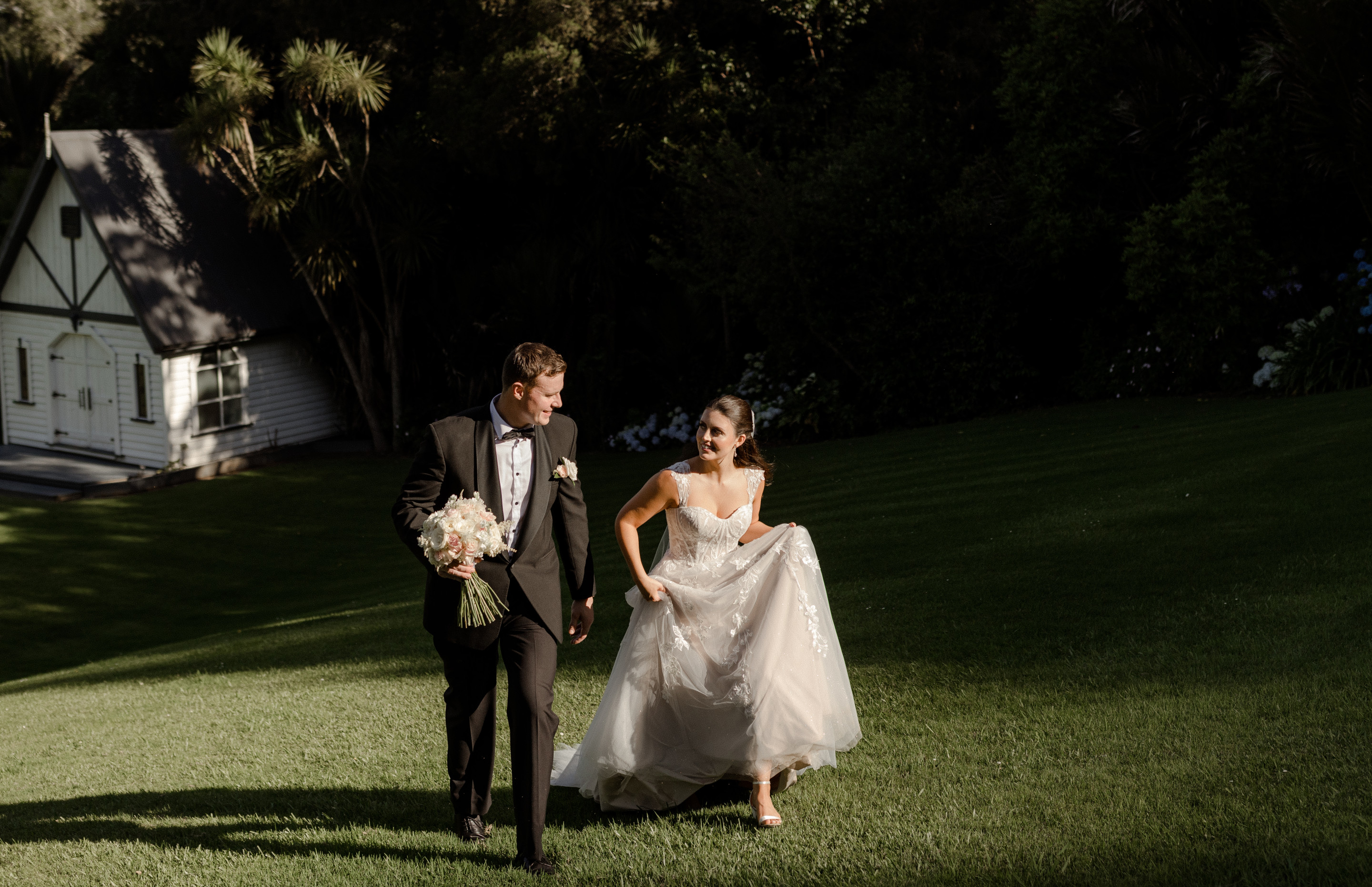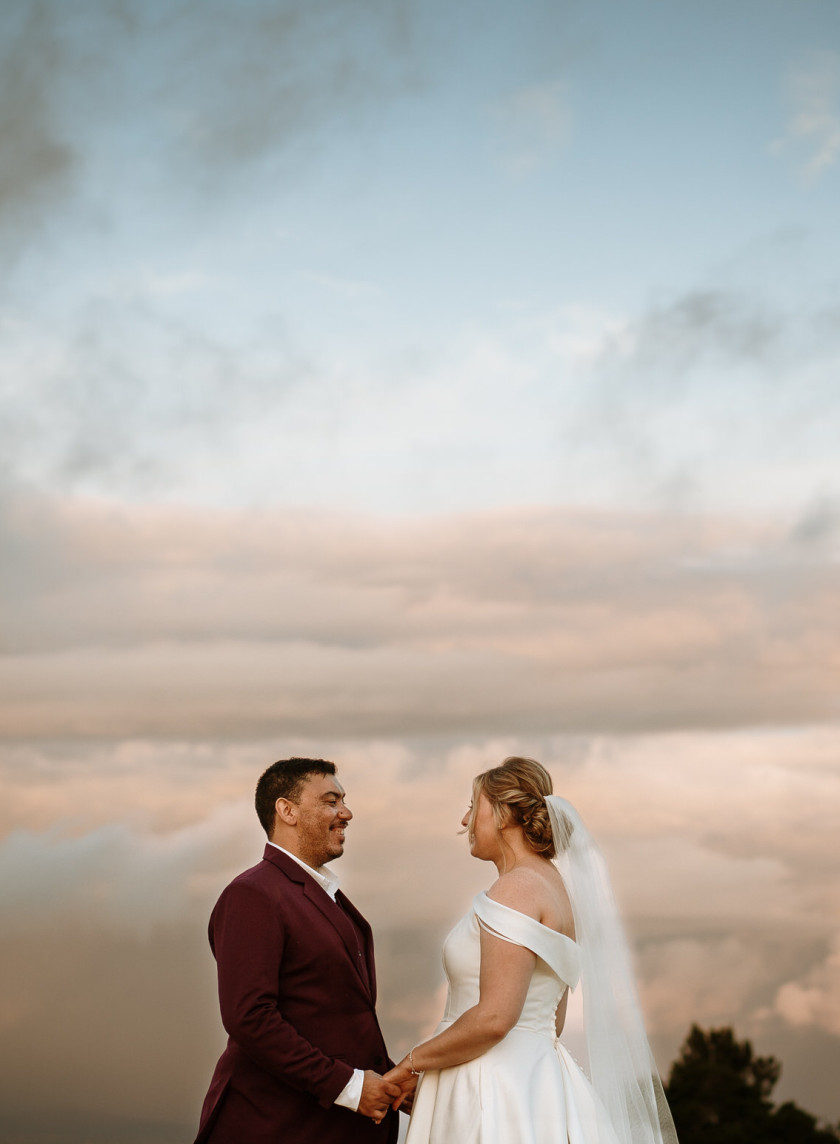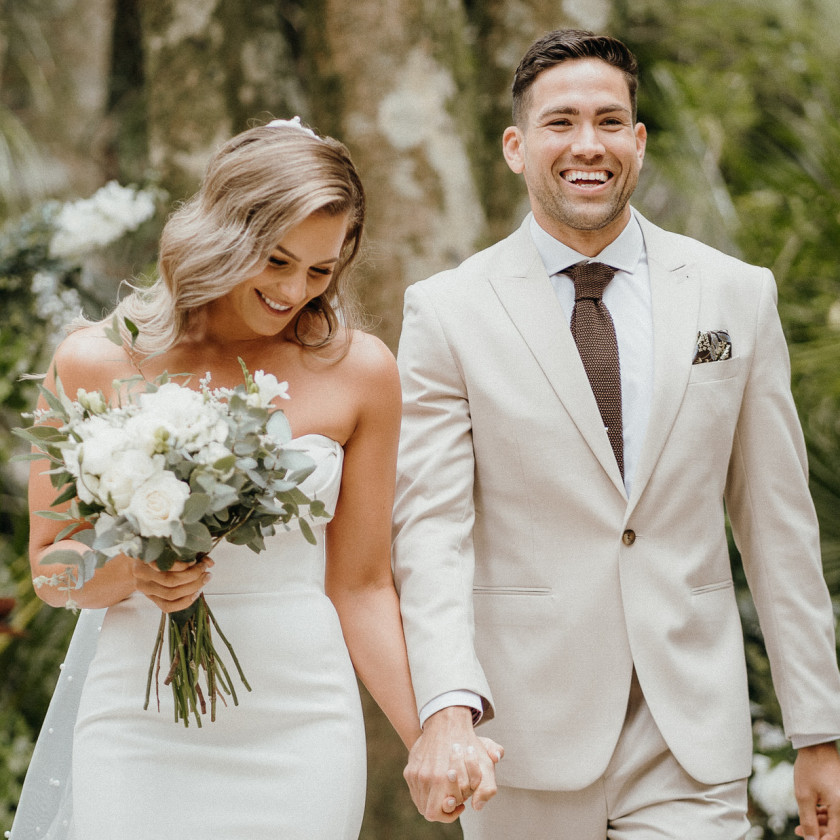The Wedding Stationery Guide: Everything You Need to Know
— By Raashka Mannie
21 March 2021
You've got mail! Now let's make sure it's all signed, sealed, delivered and yours before the big day.
The question has been popped, the answer has been a joyful 'yes!' and the planning has begun. Not far behind it all is the ins and outs of wedding invitations and stationery. It seems such a momentous task, putting together the how, when and where of it all in a succinct bundle of beauty for your guests to marvel at as they pen their RSVPs. A lot goes into the crafting of your wedding stationery, threading together your style, your preferences and your personality in sheets of embossed paper that shimmers with the details of your upcoming marriage.
And where would we be without the expert help of wedding stationery savants? Penelope from DesigningLove is here to give us the full breakdown of wedding stationery, from what to send, when and why, along with all the necessary additions and the optional ones. This is a complete guide to wedding invites and stationery from the ground up, as comprehensive as it gets and with crucial tips you'll want to take note of.

Image by DesigningLove
The Stationery Breakdown
What is included in wedding stationery? What is a wedding stationery suite?
A wedding suite covers all the wedding stationery needed for your invite. It’s typically 3 to 4 pieces of must-have stationery:
- Your invitation, giving your guests the most key details: where to be, and what day and what time.
- RSVP card, so your guests can respond and let you know if they can make it to celebrate with you in person or in heart.
- Details card, with all the extra details you want your guests to know without crowding your invitation. These include things like expected attire, accommodation recommendations, transport options and so on. You can also use your details card to direct guests to your wedding website if you have one.
- Itinerary Card, which is slightly more on the optional side and is really helpful if you are planning to do dinner rehearsals, a first breakfast, etc.
Then, of course, there are the entirely optional aspects of your wedding suite. These are personal preference and depend on your style of wedding and wishes, including:
- Events card, sporting all the fun things that you might be having at your wedding, from lawn games to cultural elements that guests can look forward to.
- Inner envelope, here to indicate, specifically, who is (and isn’t) invited; this is a great way to mention whether kids are allowed at your wedding, too.
- Reception card, which is usually slotted in if your reception is going to be held at a different location from your ceremony, giving details of the formality and type of reception you’re hosting.
- Directions, for a clear, easy explanation of where your wedding can be held because you can always account for the unexpected when it comes to special days.
What is all the information one has to include on a wedding invite? What’s optional?
When it comes to the details of your big day in your wedding invite, your invitation is the leading lady! She tells your guests all the vital information they need to know to be there to celebrate with you: the time, the day/date and the location. These three things are the most important details (along with the couples’ names, of course) that all invites should have. Any extra details about the reception, dress attire, gift registry and more all go on your details card. Keep your invitation looking sleek and gorgeous with a focus on the most important information - your key wedding day details. The goal is to keep things from getting too finicky and difficult to manage. “Doing this keeps things streamlined and easy to process,” Penelope told us, “which means less fuss and worry for you in the long run.”
How much does it generally cost, if it’s possible to estimate?
There are a ton of factors that come in to cost estimates for your wedding invitation suite, from the type of print finish to the number of invitations needed, as well as embellishments, postage, and all the tiny details in between. It’s always best to talk to your chosen supplier in detail to get a more accurate idea of what you can expect for your invitation needs and costs. They can also work with you to tailor an invite suite within your budget.
Your wedding planner will factor in your wedding stationery, too. “Actually, wedding planners often recommend to reserve around 3% of your wedding budget for wedding stationery,” Penelope divulged. “This includes all your paper items, from invitations to thank you cards, menu cards, seating plans, name cards, signage and so on.”

Image by DesigningLove
The Etiquette Breakdown
When do I send out wedding invites?
Possibly the most common question of all when it comes to wedding invitations and planning is the ‘when’ of it all. Wedding invitation etiquette is, after all, a big deal. “As a general rule of thumb, I've found that aiming to send your invites out approximately 3 to 4 months ahead of your wedding day works really well,” Penelope advised. Everyone you’re planning to invite should receive one and give you plenty of notice to adjust your wedding plans as needed. This is also a great way to factor in any international guests, giving them plenty of time to figure out their availability. It also helps to follow up with anyone who hasn’t responded - the invitation could have slipped their minds, so it’s essential that you reach out.
What's the right deadline for RSVPs?
Your RSVP should be due around one month out from your wedding day. This gives you time to confirm final headcounts with your venue and caterers - and you also have a little wiggle room to chase up those that haven’t replied. “Unfortunately, some people inevitably forget or are excited to reply and simply… don’t,” Penelope shared. “Never fear - that doesn’t mean to say they aren’t as excited as you are about your wedding! All they need is a little nudge and you’ll be on your way to celebrating in no time.”
If I do or don't want kids at my wedding, how do I make this clear without stepping on any toes?
This can be quite the path to navigate. When it comes to children at your wedding, the call is, ultimately, up to you. It should be made clear whether kids are allowed at your wedding or not from the get-go, so as not to confuse anyone. There are a number of ways to tell your guests that your wedding is going to be kid-free, such as:
- How you address your envelopes, such as Mr and/or Mrs Smith, or the Smith family, and follow this with stating the number of seats you have reserved for them on their RSVP card.
- You can also include a short line on your details card along the lines of: 'We are sorry that we are unable to accommodate children at our wedding,’ 'We would like our special day to be an adult-only occasion,’ or, 'Please be aware that this will be an adults-only wedding.'
- Alternately, if you are having children at the ceremony but not the reception: 'We are delighted to welcome children to the ceremony and early reception. However, from XXpm onwards, the wedding will be adults only’ or, 'Following the ceremony and drinks reception, please join us for an adults-only reception at XXpm.'
- Then there’s the optional extra: 'We will be providing a creche, please see our wedding website for further details.'
It is a good idea to keep in mind that guests with newborns and babies up to 6-months-old are could be breastfeeding or need to be close to their parents/guardians, so it would be expected that they would be able to attend. In this case, you could add a line such as, 'Adults only, however, babies up to 6 months old are welcome,’ so as to cater to these loved ones in your life. “Children-free weddings are totally your choice whether it be down to cost or, or your venue simply doesn't allow them,” Penelope assured. “It’s absolutely okay. How you let people know is the key part as long as you are clear from the outset.”

Image by DesigningLove
The Miscellaneous Breakdown
Wedding ceremony programs? Place cards? Escort cards? Menus? Thank you cards? Are all these things required?
There are so many options when it comes to your wedding invitation suite - you get to choose what’s vital to you on top of the basic aspects. “These are beautiful accompaniments that add to the luxury and overall cohesiveness of your wedding day,” Penelope said, “such as place cards, escort cards, menus and much more. The bonus is that they are all super helpful, too!” After all, everyone needs to know where they’re sitting and what scrumptious meal is on the way. For example, if you are doing a buffet-type meal, labels for each dish noting details such as gluten-free, dairy-free, etc. would be sufficient; there’d be no need for a menu. Alternatively, if you are doing a sit-down dinner, personal menus are a darling touch; you can also combine the menu with their name, serving as a place card, too. Thank you cards are one of the best additions, whether they’re grateful letters after your wedding day or notes at each guests’ seat. They’ll be over the moon to know just how magical their presence made your big day.
At the end of the day, however, how many of these items you have are totally dependent on what is important to you and what your wedding style is.
Do people have to include a map to the wedding?
Maps are incredibly handy when it comes to wedding invites - it’s also totally a personal preference as to how. “I've had clients share cute hand-drawn maps and others choose to add directions via Google Maps on their wedding websites,” Penelope informed us. Maps can make your wedding invitations more meaningful and personal depending on how you include them; something hand-drawn, monogrammed or embellished in a thoughtful way really adds character to your wedding invite.
Wedding invites vs. save the date cards - what’s the difference? Is the second one needed?
Save the Dates are not always needed, especially if you have a short engagement. “They essentially serve as a heads up that your wedding is on the way and they are on the guest list, so keep an eye out for our formal invitation,” Penelope said. “It’s best to only send a Save the Date to guests that you plan to invite to your wedding, as uninviting them is pretty awkward.” Your wedding invitation, on the other hand, is a formal invite to your guest to come and celebrate your wedding with you. It has all the details they need to know to attend your big day. Save the Dates are particularly useful for guests that live far away or have packed schedules, accounting for their travel arrangements and the possibility of accommodation.

Image by DesigningLove
If you want to find out even more about wedding stationery, take a look at DesigningLove's profile for an expert's insight into your wedding needs.



